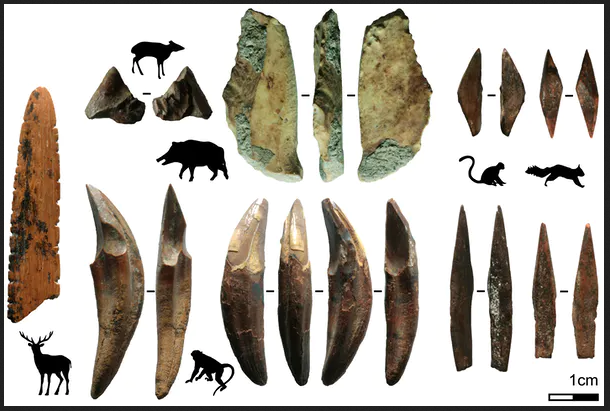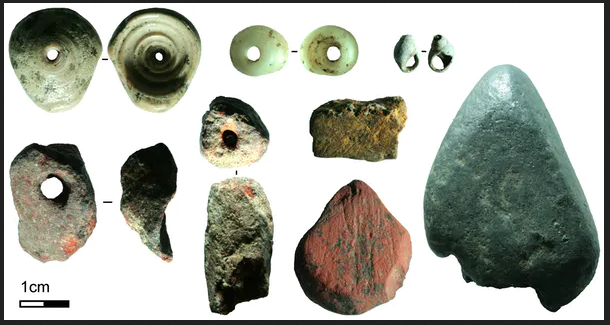News
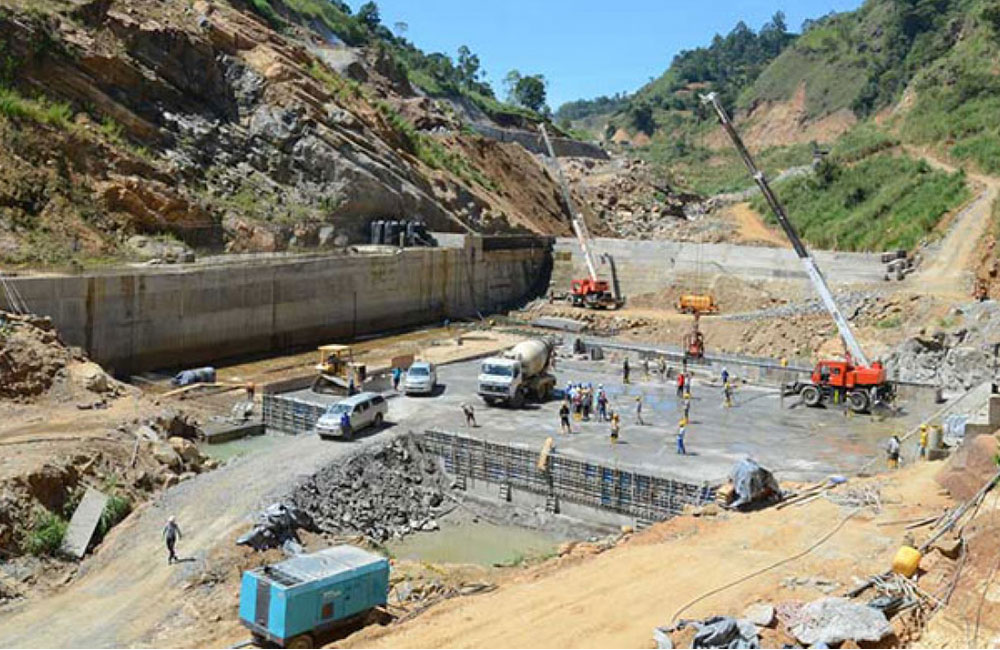
85 technos from Iran to complete Uma Oya Project
The President's Media Division said that 95% of the Uma Oya project has already been completed and the remaining work is to be completed before December this year.
The project will add 120 MW of electricity to the national grid.
After undergoing the mandatory PCR test at the airport, they were directed to the quarantine centres run by the Army, President's Media Division said adding that at the end of the quarantine period, the group will have to undergo a second round of PCR tests and will be taken to the project site thereafter.
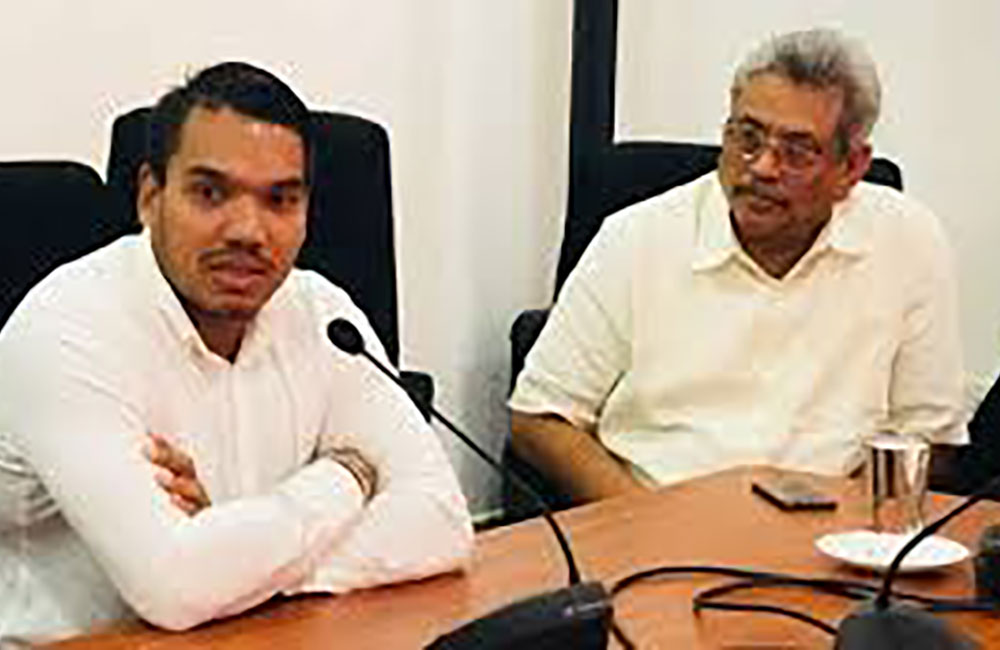
Namal condemns police assault on protestors; calls for probe
The Prime Minister's son has called for a probe into the incident and observed that the recent behaviour of some members of the Police should not tarnish the track record of the entire Police Department and the great job done during COVID -19 pandemic
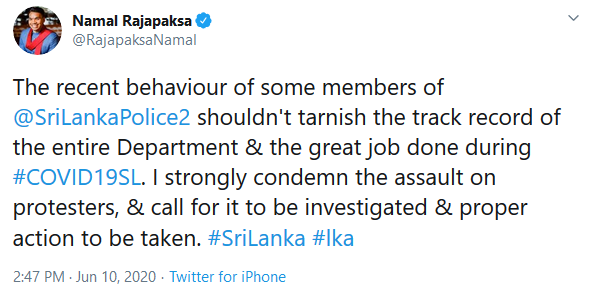
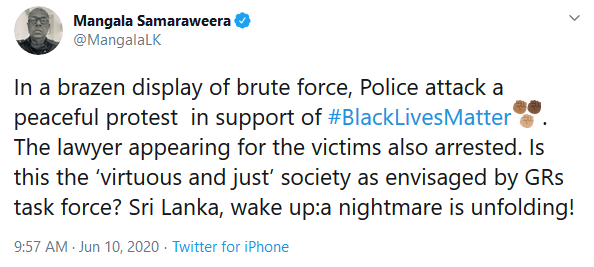
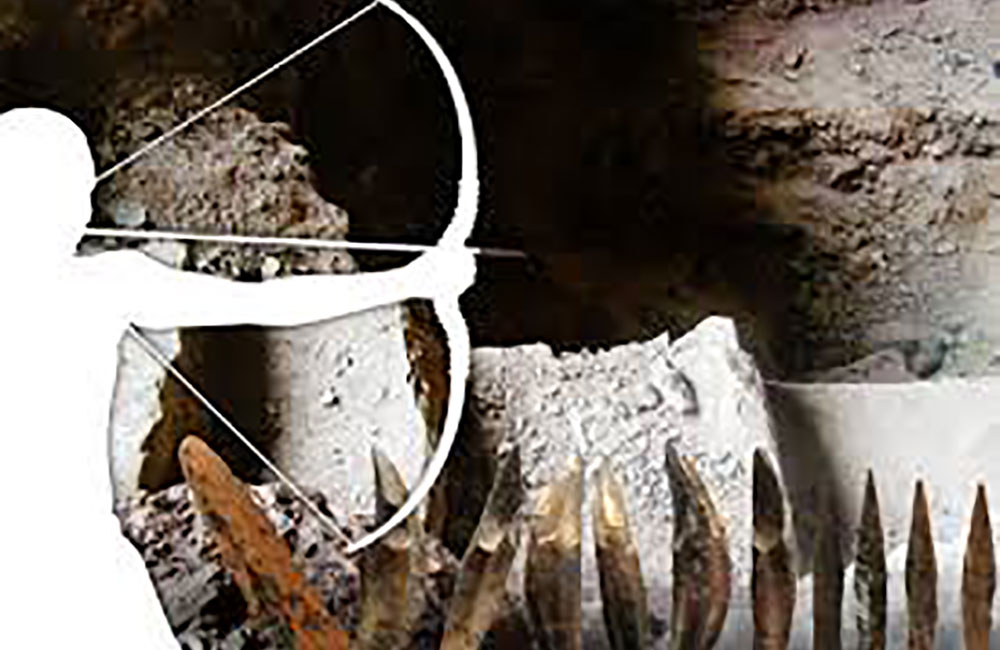
48,000-year-old arrowheads reveal early human innovation in the Sri Lankan rainforest
Archaeological excavations deep within the rainforests of Sri Lanka have unearthed the earliest evidence for hunting with bows and arrows outside Africa.
At Fa-Hien Lena, a cave in the heart of Sri Lanka’s wet zone forests, we discovered numerous tools made of stone, bone, and tooth – including a number of small arrow points carved from bone which are about 48,000 years old.
When was the bow and arrow invented?
The invention of the bow and arrow allowed people to hunt prey at a much greater distance. People no longer had to get within “a stone’s throw” of prey which could suddenly bolt and escape. This innovation greatly increased the chances of a successful hunt.
Bows and arrows also made it much safer to hunt dangerous prey. If you don’t have to get too close, you’re less likely to be trampled or mauled by a hurt and angry animal.
The origin of the bow and arrow is one of the great mysteries of human technological innovation. How did it come about? When? Where? And why?
Currently, the oldest evidence for the use of the bow and arrow are small stone points found in Sibudu cave in South Africa, which are some 64,000 years old.
Outside Africa, the oldest finds were previously pieces of bows found in Germany dating back no more than 18,000 years.
Because bows and arrows are mainly made from highly perishable stuff like wood, sinew, and fibres, they don’t leave a lot of evidence behind for archaeologists to find. So the small bone points recovered from Fa-Hien Lena are an important discovery.
The bone points show evidence for having been fixed to a small shaft and shot at high speed into prey – which were apparently mostly small monkeys and giant squirrels, judging by the butchered bones thrown away at the site after meals.
Complex tools, complex minds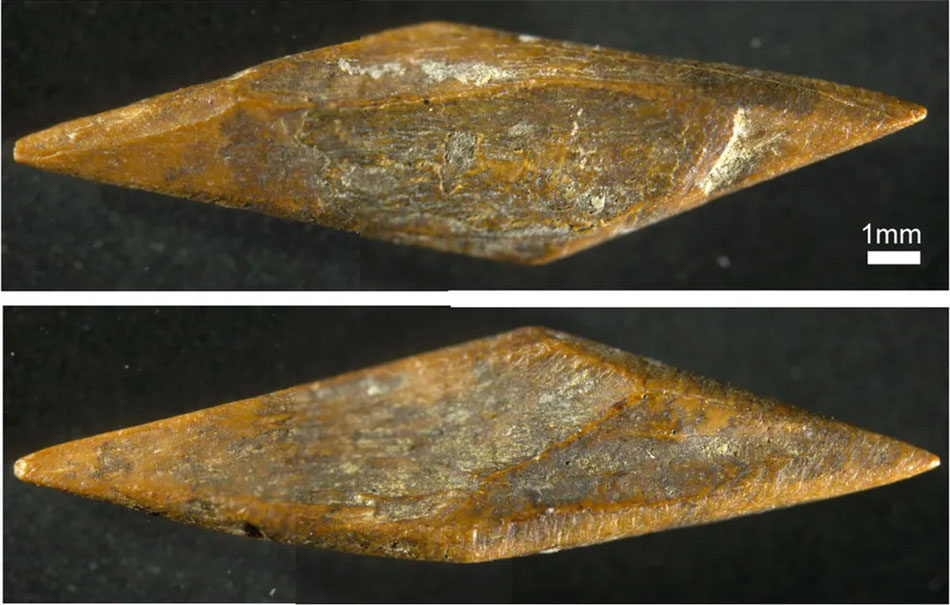 One of the small bone points discovered at Fa-Hien Lena. M. C. Langley
One of the small bone points discovered at Fa-Hien Lena. M. C. Langley
The discovery of such ancient bone arrow points is startling in itself. However, we also found other tools which give equally rare insights into the lives of the earliest members of our species currently documented in Sri Lanka.
Particularly interesting are well-preserved knives, scrapers, and awls made from the bones and teeth of monkeys and deer, which were used to work skins or plant materials.
These tools are our only way to learn about the other, more fragile items that may originally have been at the site, because anything made from leather or plant fibre (such as clothing, bags, baskets, mats, or nets) stood no chance of surviving 48,000 years in the humid tropical environment.
One of these artifacts is an unusual implement with carefully spaced notches down each side. It appears to be a shuttle for creating nets of woven fibres. No doubt nets would have been incredibly useful for catching the tree-dwelling prey the people of Fa-Hien Lena hunted, as well as bringing the fish up from the rivers.
These rainforest pioneers also left behind evidence about their social lives in the form of white shell beads and small blocks of mineral pigments in bright colours: red, yellow, and silver.
Each of the pigment nodules show signs they were used to create paints for the body, and three of the bright red nodules were drilled to be strung as beads – something we have not found anywhere else in the world.
The white shell beads, on the other hand, are similar to those found in Africa and Eurasia, but were collected or traded from the coast some 20–30 kilometres away. Apparently, small, shiny, white shell beads never get old.
With these finds, it is becoming more and more clear that we have only just begun to scratch the surface when it comes to understanding the earliest modern human communities.

Microsoft partners with Sri Lanka’s first education institute dedicated to the field of Artificial Intelligence
Located at the Colombo Innovation Tower, AI Academy is an incubator for students and business professionals to implement innovative ideas, apply emerging technologies, and embrace lifelong learning. It offers undergraduate and graduate programs, executive part-time courses and knowledge sharing forums; also providing collaborative projects to support industries, start-ups, and governments.
As part of the arrangement, Microsoft will provide AI Academy with cloud-enabled software and tools for teaching and learning through Microsoft Hands-on Labs and other industry-recognized programs such as Microsoft Learn, AI Lab, AI School, and AI Business School to ensure its students and working professionals are exposed to practical applications of AI.
AI Academy will leverage Microsoft 365 and Microsoft Teams to support virtual teaching and learning with international faculty while regional Microsoft specialists will help conduct AI business workshops and hands-on technical lab sessions to help participants identify business challenges that can be optimized with the help of AI—driving AI literacy and empowering the workforce of Sri Lanka to deliver more value.
“Our partnership with Microsoft represents our commitment to address the unmet needs of students and working professionals in Sri Lanka by empowering them with the tools and capabilities to go from envisioning to rapid prototyping,” said Lin Gong-Deutschmann, Co-founder, AI Academy. ”AI will transform industries and societies, so governments, technology companies, businesses, academia, and society will need to work together to reform the curriculum in higher education to meet local and global market demands and prioritize technology-based education in driving faster economic growth, creating a skilled resource pool for economic transformation.”
Lin Gong-Deutschmann, Co-Founder, AI Academy (Top Left); Hasitha Abeywardena, Country Manager, Microsoft Sri Lanka and Maldives (Top Right); Ashiq Niyas, Territory Channel Manager, Microsoft Sri Lanka and Maldives (Bottom Left); and Sachindi Weerakoon, Business Strategist, AI Academy (Bottom Right) during the virtual signing via Microsoft Teams
“We look forward to building on our partnership with Microsoft to further strengthen Sri Lanka’s capabilities, and enhance our competitiveness as a global hub for students and business professionals in all sectors,” added Lin.
“It’s great to see AI Academy and its leadership set an example by investing in the workforce of tomorrow,” said Hasitha Abeywardena, Country Manager, Microsoft Sri Lanka and Maldives. “By building their own unique digital capabilities, AI Academy is becoming a fast adopter of best-in-class technology. AI is one of the technologies that will transform every industry, and we’re proud to be partners with AI Academy in readying and upskilling their students and working professionals.”
AI Academy has announced plans to set up a physical AI Experience Center to encourage the public to explore and experience what is possible with emerging technology. Its educational programs will be very much integrated with industry requirements and the practical applications of AI. Subject areas include, but are not limited to, data science, machine learning, computer science, data analytics, and intelligent systems.
“With this partnership, we see a potential to scale and drive our efforts to empower the market with the right tools and technology. We can help to further accelerate AI-enabled digital transformation, build coalitions to nurture a vibrant local technology ecosystem, close the digital skills gap and create societal impact from innovations in AI,” added Hasitha.
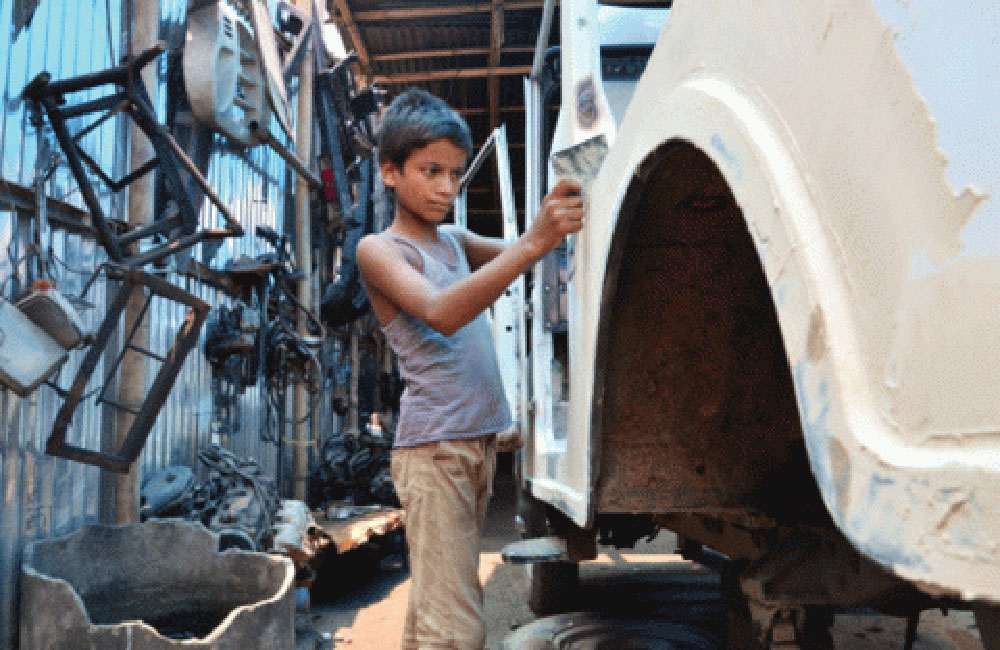
Sri Lanka raises minimum working age from 14 to 16 years
The amendment to the labour law meets the need to harmonise the working age with that of compulsory education, as well as bring the country’s legislation in line with the UN Convention on the Rights of the Child.
According to the International Labour Organisation (ILO), at least 152 million children are working worldwide. Of these, 72 million do so in hazardous conditions.
This is reflected in child labour mortality data. Around 48 per cent of child labourers who die are aged 5 to 11 years, 28 per cent are between 12 and 14 years, and the remaining 24 per cent fall in the 15-to-17 bracket.
About 71 per cent of working children are engaged in agriculture, which includes fishing, livestock herding, aquaculture, and forestry.
According to the ILO, in 2016 in Sri Lanka had 103,704 working children, which represents a sharp drop compared to a decade before, when the figure was around half a million. Of the children working, 39,007 are engaged in hazardous forms of child labour.
In Sri Lanka, working children are employed mainly in fishing, to feed themselves and their family. They belong to fishing families and tend not to want to go to school, nor do they have another trade in mind.
A 15-year-old boy from the western province, near Chilaw Beach, told AsiaNews that he does not like going to school because he is lazy. He finished school, but did not take the final exam.
He said that he goes fishing to earn money. “If you have money, you can do many things. This is our traditional way of life and I want to continue living the same way.”
According to the ILO, the COVID-19 pandemic has led to a rise in child labour. “As economic contraction reduces opportunities in the labour market for parents, it can push their children into hazardous and exploitative work,” reads an ILO report.
Melani Perera
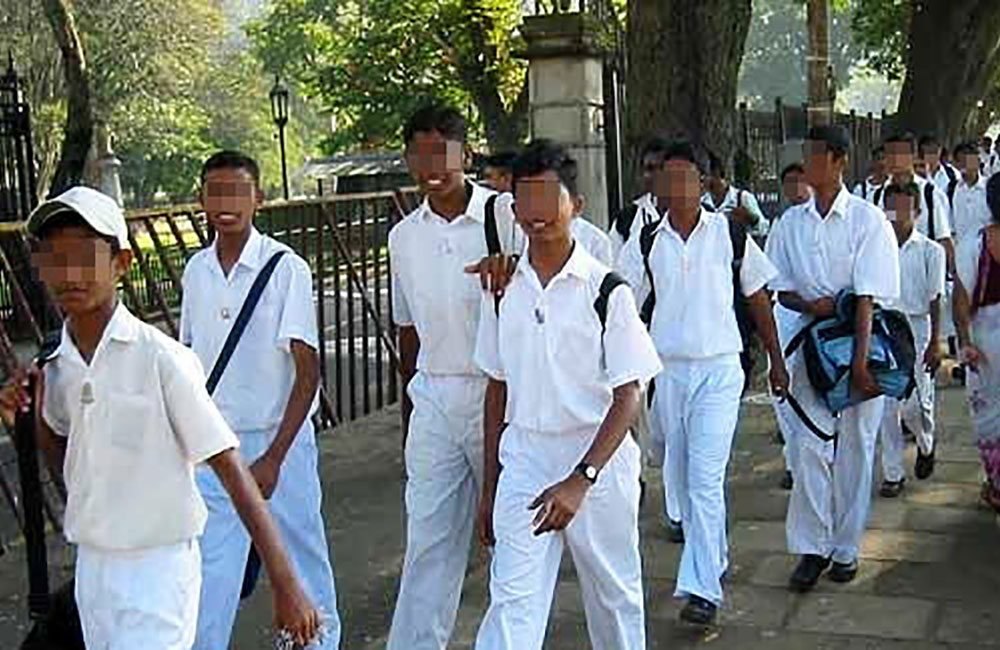
Govt. schools set to re-open on June 29 under four stages
All government schools are set to re-open in four stages from June 29, minister of education Dullas Alahapperuma announced yesterday.
Addressing a press conference at the ministry of education, minister Alahapperuma said that the government decided to close schools on March 13 following the Covid-19 outbreak and observed that schools will reopen for teachers, principals and non-teaching staff on June 29. He added that the decision to open schools in four stages was taken after discussions with the President, Health and Education ministry officials and officials of the Presidential Task Force.
STAGE 01
Commence on the 29th of June and it will only be for Principals, Teachers, Non-Academic Staff and Management.
The entire week starting from the 29th of June will be used to disinfect and clean schools as well as to add upgrades to the existing school system and for meetings between schools and parents.
STAGE 02
Commence on the 06th of July and it will be only for students of Grades 05, 11 and 13 and it will be in effect until the 17th of July.
STAGE 03
Commence on the 20th of July and it will only be for students of grade 10 and 12.
STAGE 04
Commence on the 27th of July and it will be only for students of Grades 03,04,06,07,08 and 09.
Furthermore, minister Alahapperuma said the Advanced Level examination will be held from September 7 to October 2 while the Grade 5 scholarship examination will be held on September 13.
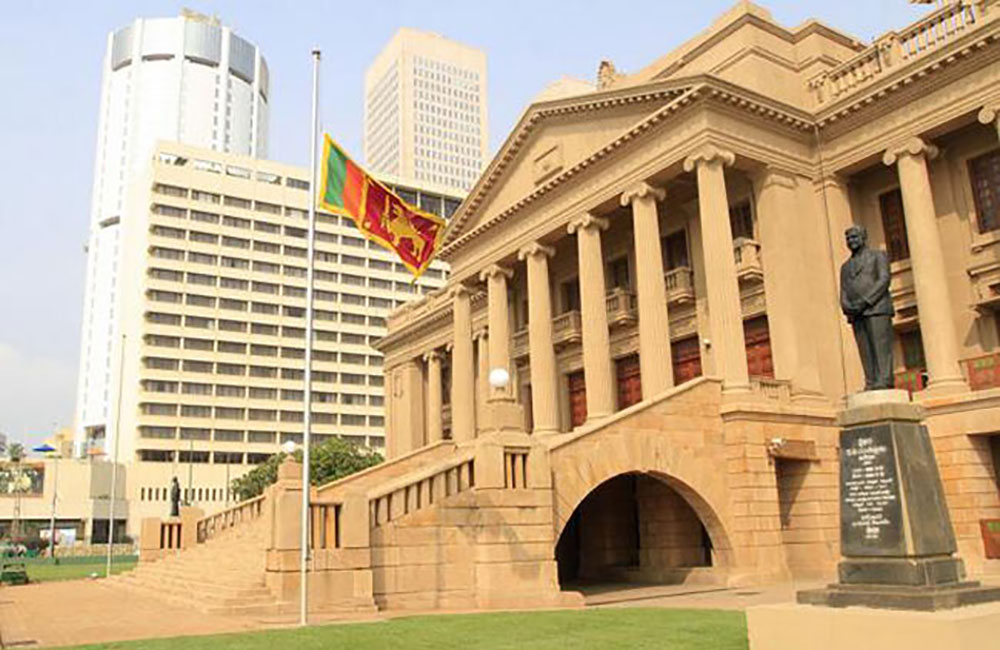
President appoints an Ombudsman to address public grievances
Retired Senior Deputy Inspector General of Police S. M. Wickremasinghe has been appointed to the post.
The objective of setting up an Ombudsman Office is to provide solutions to any inconvenience or distress caused to the public as a result of negligence of public officers or acting beyond their limit while exercising their administrative powers.
The office is located on 3rd Floor, Old Standard Chartered Bank Building, Janadhipathi Mawatha, Colombo 1.
The public has the opportunity to submit their complaints or grievances in person by visiting the office or they can forward their issues by post addressed to “Ombudsman, Presidential Secretariat, Colombo 1”.
The public can reach the office through the telephone/ fax no. 011 2338073 or sending an e-mail to This email address is being protected from spambots. You need JavaScript enabled to view it..
Ombudsman S. M. Wickremasinghe says people also can complain about large scale drug trafficking which causes disruption to the civilian life, damages to the environment and any other illegal activity to him.
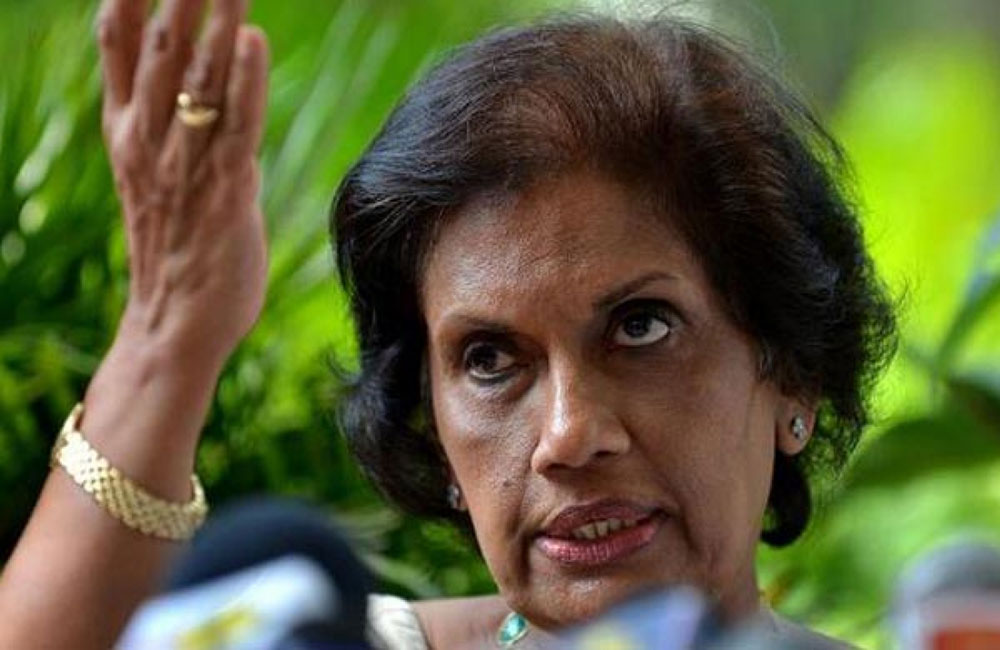
Police attack on peaceful protestors is shocking: CBK
"The Government statement that the peaceful protest was illegal can not be accepted. In a democracy, every citizen has a right to express protest, without violating the law," the former president said.
She noted that it is the sacred duty of the government and the law enforcement authorities, namely the Police, to guarantee and protect that right of the citizen and not violate it.
"I appeal to the government to exercise it’s authority to guarantee all fundamental freedoms of every Sri Lankan citizen, irrespective of his/her ethnicity, religion, political beliefs. May freedom and Metta prevail in our country," she said.
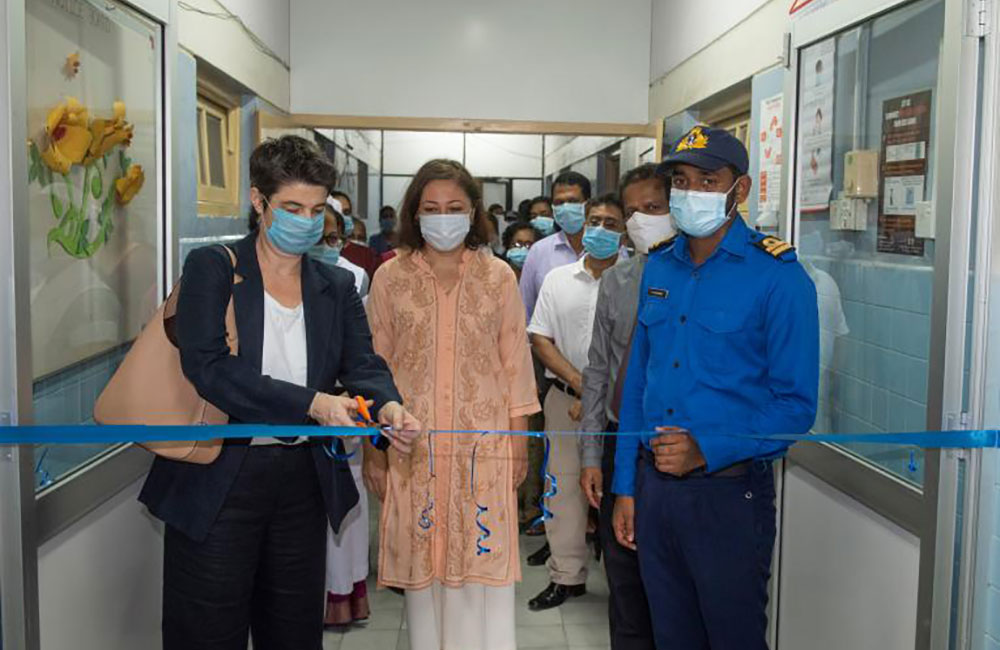
COVID-19 isolation and treatment units established with UNICEF support
The isolation units were set up at the Lady Ridgeway Hospital for Children, Castle Street Hospital for Women and the Base Hospital Minuwangoda. The hospitals were identified by the Ministry of Health as part of a rapid assessment for COVID-19 patient isolation and treatment purposes.
UNICEF contributed with technical expertise and funding of nearly LKR 5 million from the Japanese government while the construction expertise and labour for the refurbishment was provided by the Sri Lanka Navy.
“It is vital that we continue to support the Government of Sri Lanka in responding to the coronavirus pandemic. The setting up of the special isolation and treatment units at these hospitals is a truly a collaborative effort involving much needed assistance from the Government of Japan and the Sri Lanka Navy,” Emma Brigham, Deputy Representative of UNICEF Sri Lanka said.
This work involved the refurbishing of existing hospital spaces and the installation of ventilation and sound systems, adequate facilities for infection prevention and water and sanitation for health and establishing of a layout in line with social distancing requirements.
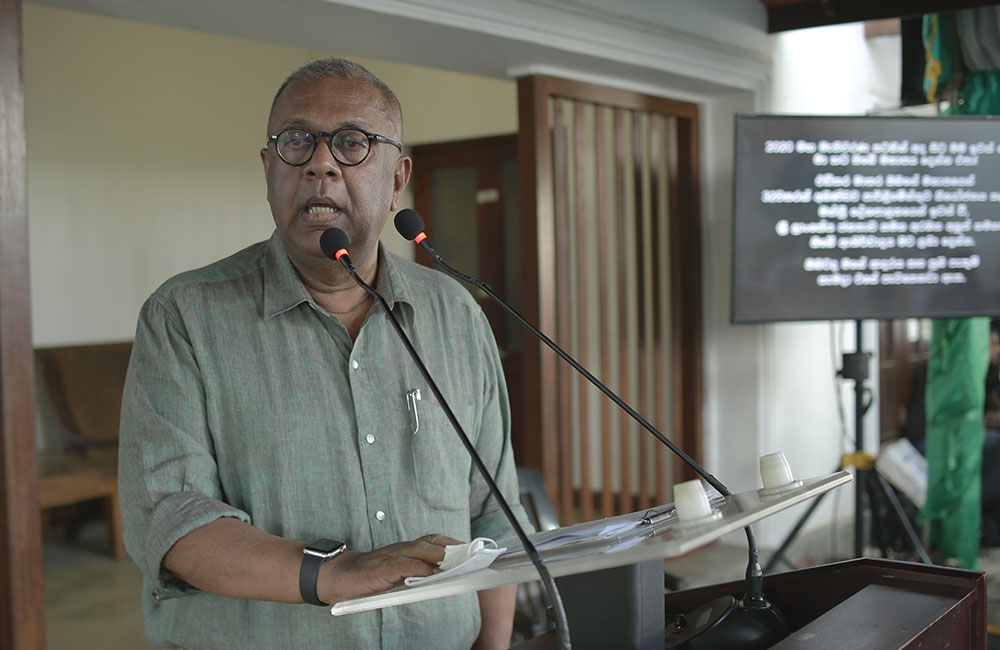
Mangala steps down: calls for a new progressive movement
He emphasized that it is necessary to initiate a movement towards a progressive political trajectory in Sri Lanka in partnership with the people in this country who respect democracy, and the different social identities and cultural traditions in the country, and people who are not overwhelmed and consumed by hatred towards one another. He urged the people in this country who are not governed and guided solely by their racial, caste, religious, ethnic and gender identities at birth and those who are free of political, cultural and social hypocrisy to come together and join forces for this purpose.
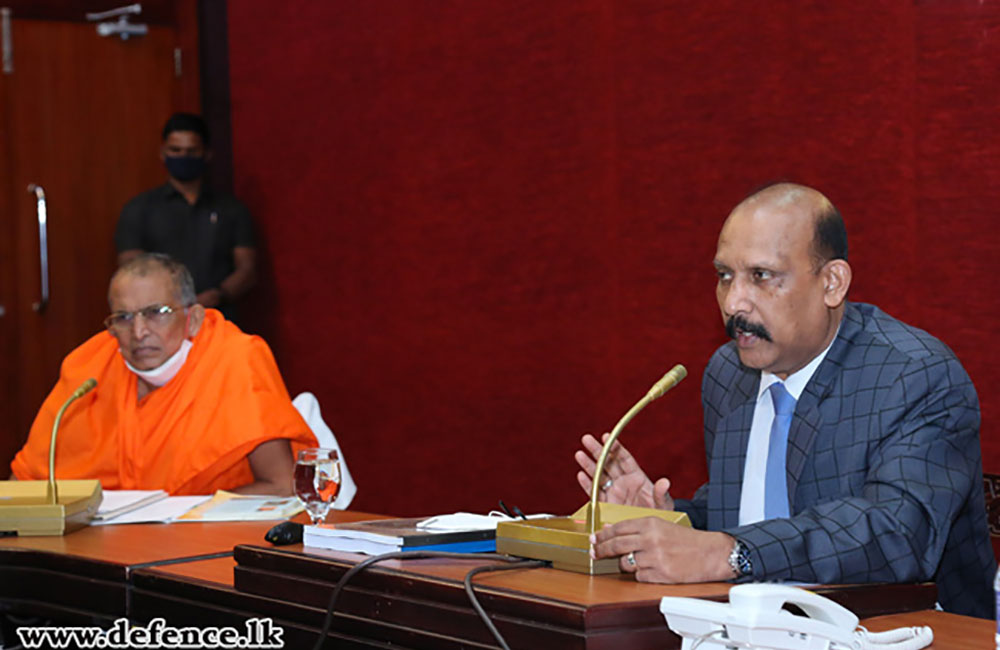
PTF to conserve and restore archeological sites irrespective of the religion: Defence Secretary
The Presidential Task Force (PTF) on ‘Archaeological Heritage Management in the Eastern Province’ has been tasked to conserve all archaeological heritage sites in the Eastern Province irrespective of religion, Defence Secretary Maj.Gen. (Retd) Kamal Gunaratne said.
Addressing the members of the PTF on ‘Archaeological Heritage Management in the Eastern Province’, at their inaugural meeting at the Defence Ministry today, the Defence Secretary, who is the Chairman of the PTF, requested all Sri Lankans irrespective of their race, religion and other differences to support the PTF to preserve Sri Lanka’s historical heritage in the Eastern Province for future generations.
“We have many historical archaeological sites in the Eastern Province and many are under threat due to different reasons, today. The Government wants to conserve and restore these sites irrespective of the religion or ethnic group that they belong to as they are national heritage sites,” he said.
The Defence Secretary said the PTF would work closely with all the ethnic groups in the Eastern Province to restore and manage those historical archaeological sites.
The members of the PTF discussed matters related to planning and implementation of its tasks. During the discussion, the members representing different establishments agreed upon sharing knowledge and mutual cooperation with a view to bringing everyone into one grid in implementing the PTF’s mandate.
The 11-member PTF is given the task of identifying sites of archaeological importance in the Eastern Province, identifying and implementing an appropriate program for the management of archaeological heritage by conserving and restoring such identified sites and antiquities, identifying the extent of land that should be allocated for such archaeological sites and take necessary measures to allocate them properly and legally and preserving the cultural value of sites of archaeological importance and promoting the uniqueness of Sri Lanka, both locally and internationally and making recommendations to promote such heritage.
The PTF members during the meeting emphasized the importance of getting the support of local communities whose knowledge and information on the sites would be of significance to conserve them. They also agreed to initiate viable options in conserving and restoring archaeological and heritage sites already identified as a stepping stone of the PTF’s work on the ground while simultaneously utilizing available resources in discovering more sites in the Eastern Province.
A decision was arrived at creating a database of archaeological sites with the inclusion of geo-spatial data enabling effective and transparent implementation in preservation and conservation efforts.
The PTF members - Purawidya Chakravarthi Ven. Ellawala Medhananda thero, Chief Prelate for the Eastern and Northern Provinces Ven. Panamure Thilakawansha thero, Governor Eastern Province Anuradha Yahampath, Director General of Archaeology Dr. Senarath Bandara Dissanayake, Land Commissioner General Chandra Herath, Surveyor General A.L.S.C. Perera, Prof. Raj Kumar Somadeva, Prof. Kapila Gunawardena, Senior DIG Western Province Deshabandu Thennakoon, Provincial Land Commissioner, Eastern Province H.E.M.W.G. Dissanayake, Chairman of Derana Media Network Dilith Jayaweera and Senior Assistant Secretary to the President Jeevanthie Senanayake were present in the meeting.
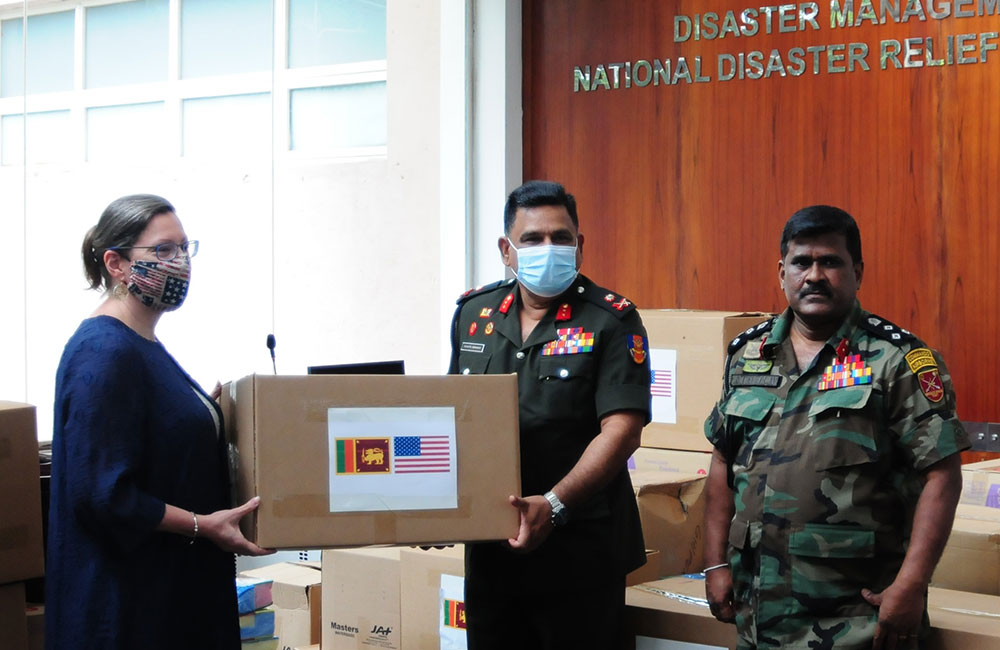
US donates equipment to Sri Lanka's frontline responders for Covid-19
The U.S. Department of Defense funded the donation, which includes more than 48,000 masks, safety goggles, and isolation gowns with hoods. All items were purchased in Sri Lanka in order to champion Sri Lankan businesses as they recover from COVID-19’s economic impact.
“The United States is proud to assist Sri Lanka’s frontline responders as they care for Sri Lankans suffering from Coronavirus,” said Ambassador Teplitz. “Helping to protect these healthcare workers while supporting Sri Lankan businesses and jobs is just one component of our deep friendship.” The donation is part of U.S. support to expand the flexibility, agility, and resilience of Sri Lanka's disaster response sector.
In coordination with the Ministry of Defense and disaster relief authorities, the donations will be distributed to the following health care facilities:
Page 402 of 663
